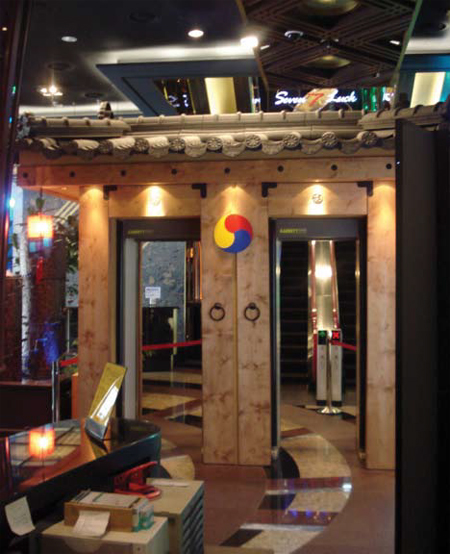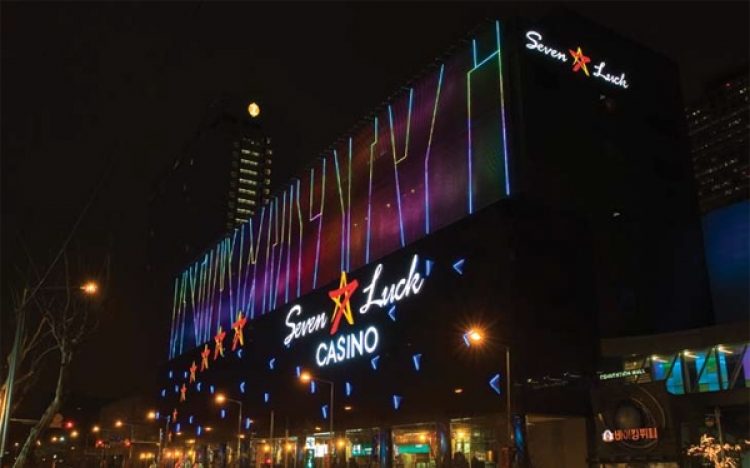Only one of South Korea’s 17 casinos is open to locals, with the rest restricted to foreigners, and mainly dependent on Japanese high-rollers. Business could fall precipitously should Japan legalise casinos, as expected shortly. Inside Asian Gaming visited South Korea in order to assess the outlook for the casino industry and tour the country’s new government-run casinos.
South Korea’s casino industry was long dominated by the Paradise Group, which in 1968 opened what is now the country’s best known casino at the Sheraton Walker Hill Hotel in the capital city, Seoul. The country’s first casino, also opened in 1968, is in Incheon, where the international airport serving Seoul is located. The Incheon property was taken over by the Paradise Group in 2001. All four of the Paradise properties in Korea are modest-sized, with Walker Hill featuring 59 gaming tables and 40 slot machines. Paradise also notably operates the largest casino in Kenya, Africa – the Paradise Safari Park & Casino offers 40 tables and 600 machines.
Observing the positive impact on overall revenue and visitor numbers that resulted from the ending of Macau’s 40-year casino monopoly, the South Korean government decided to stimulate competition in its own country’s casino market by forming Grand Korea Leisure Corp (GKL). GKL is a subsidiary of the Korea National Tourism Organisation (KNTO), and in 2006 opened three properties under its Seven Luck brand.
Brand philosophy
Two of the Seven Luck casinos are located in Seoul, and the third in Busan, the country’s second largest city. While each of the Seven Luck properties offer differing décor and facilities, the brand philosophy throughout is to provide guests “a cultural experience,” rather than “just a place to gamble,” according to CEO Jung-Sam Park.
The first of the Seven Luck casinos opened in January, the second at the end of May and the third at the end of June. Although they were not operational for the full year, the three casinos generated combined gaming revenue of US$153 million in 2006, exceeding the company’s target of US$100 million. Furthermore, according to Shinyoung Securities in Korea, although casino revenue growth averaged 4.2% a year between 2002 and 2005, with the arrival of competition, growth is forecast to average 16.8% for the three years from 2006.
Mr Park believes Seven Luck’s focus on customer service and provision of a unique cultural experience is the key to the company’s strong debut. He contrasts Seven Luck’s decision to emphasize its Korean roots to the pursuit of generic Vegas-style glitz by casino developers elsewhere in the region. “So far, the casino industry in Asia has been focused on recreating the Las Vegas strip. Macau is now dubbed ‘Asia’s Las Vegas’, which means it is no different from Vegas. Macau has a taste of Asia, but is being developed by western capital, predominantly from Las Vegas. Seven Luck, on the other hand, incorporates Asian culture into everything from door knobs to our customer-service spirit.”
Healthy start
The revenue generated by foreigner-only casinos in South Korea grew 11% from US$457 million in 2005 to US$505 million in 2006, with visitor numbers surging 73% from 57 million to 99 million. Seven Luck attributes a large part of the growth to the opening of its three casinos. Although only one of South Korea’s casinos is open to locals, it is the country’s biggest, and brought the country’s total casino revenue for 2006 to about US$1.3 billion. Japanese customers made up 54% of Seven Luck’s customers, followed by mainland Chinese at 8% and Hong Kong customers at 6%. Many of the remainder are wealthy South Korean residents holding foreign passports.
Japan Casino Threat
In the last issue of Inside Asian Gaming, CLSA’s Aaron Fischer wrote of Japan’s Casino Opportunity. That opportunity clearly presents one of the biggest threats to the South Korean casino industry, given its heavy reliance on Japanese high-rollers.
According to Mr Fischer, CLSA believes the bill seeking the legalisation of casinos could be proposed for approval in the next 12-18 months.
Hakubun Shimomura, the chief secretary of a Japanese parliamentary panel called the Study Group to Promote International Tourism, stated “in the best-case scenarios in which a new law is passed in 2007, we believe we could have the first two venues operating by late 2008.” Mr Fischer feels this timing is too aggressive and unlikely, and that using Singapore and Macau as a guide and factoring the pace of change in Japan, casinos there would not likely be operational until post 2010.
That gives South Korea and Seven Luck some breathing space at least to continue to further develop and refine casinos offering a uniquely Korean cultural experience, which Mr Park argues will allow the country’s casino industry to continue to thrive in spite of intensifying regional competition.
 “The legalization of casinos in Japan has been a hot issue for a while,” explains Mr Park. “The majority of people think it will definitely hurt the Korean casino market. However, in the long run, Seven Luck has no doubt that legalization of casinos in Japan can turn into a great opportunity to enlarge the Far Eastern casino market by furthering acceptance of casino gaming in the region.” He adds that although his company is presently “highly dependent” on Japanese players, it will waste no time in diversifying its customer base and tapping into new markets all over the world.
“The legalization of casinos in Japan has been a hot issue for a while,” explains Mr Park. “The majority of people think it will definitely hurt the Korean casino market. However, in the long run, Seven Luck has no doubt that legalization of casinos in Japan can turn into a great opportunity to enlarge the Far Eastern casino market by furthering acceptance of casino gaming in the region.” He adds that although his company is presently “highly dependent” on Japanese players, it will waste no time in diversifying its customer base and tapping into new markets all over the world.
Far from neglecting Japanese customers, however, Mr Park says Seven Luck will focus on retaining their loyalty. After all, he explains, “according to market research, it costs 80% more to attract new customers than to keep loyal customers on board. In order to retain the loyalty of Japanese VIP players, Seven Luck hosts regular special events such as dinner shows, private parties, and tournaments.” In fact, following his interview with Inside Asian Gaming at Seven Luck’s Seoul headquarters, Mr Park rushed to catch the express train to Busan where he was to host a dinner featuring an appearance by a famous Japanese pop star for 200 Japanese high-rollers.
Mainland marketing difficulties
Mr Park explains that “Seven Luck has faced difficulties to market to Chinese customers, but we will look into ways to attract more Chinese customers by strategic customer segmentation.”
Macau may seem a more obvious draw than South Korea for mainlanders, especially given the massive casino development in progress in the city. However, South Korea has several advantages over Macau. Although the latter is accessible by car or bus from the wealthy southern coastal mainland province of Guangdong, Seoul is a mere hour and a half by flight from Beijing, while flying to Macau from China’s capital takes over three hours. Furthermore, being a part of China may not necessarily weigh in Macau’s favour when mainlanders are making holiday plans. Not only may China’s burgeoning middle-class find travelling to a destination that is not part of their country a more exotic option, but mainland high-rollers wishing to maintain their anonymity – and not just government officials hoping to avoid detection – may feel safer placing their bets in South Korea.
South Korea attracted 6 million international tourists in 2006, far short of its targeted 10 million, but the number of China visitors has shown strong growth, reaching 1 million for the year, up from 440,000 in 2000. South Korea also offers Chinese visitors a much more diversified offering than tiny Macau. A KNTO survey of Chinese visitors to South Korea in 2006 found that 89% of respondents chose to travel to the country for the shopping, 57% for sightseeing and 38% for food. “Guests are gambling as part of their shopping fun and entertaining themselves with massage or Korean films,” said Kim Hyung Jik, head of the casino sales team at the Seven Luck casino in Seoul’s Hilton Hotel, pictured in this issue’s Tour of the Properties on page 26.
Resort ambitions
Asked whether Seven Luck has plans to develop Vegas-scale casino resorts, Mr Park responds that the company is currently concentrating on developing its identity and management and customer-service abilities to international standards, and once ready, will consider building mega resorts. He adds that Seven Luck would also look at taking on major international resort operators as partners, who would provide not only investment funding but also operating know-how.
Seven Luck is currently focused solely on gaming, “but in future will seek to add other entertainment elements to its brand,” says Mr Park.
In addition, South Korea boasts one of Asia’s most tech-savvy populations, and “the entire Seven Luck casino experience is automated, from the entrance to real-time tracking of gaming win or loss,” points out Mr Park. “Guests can check their reward credits any time using a card-reading kiosk at the entrance.”
Not content with simply using an off-the-shelf solution, Seven Luck has also developed its own proprietary technology to track guests’ preferences and offer customized services in order to raise the level of customer satisfaction and loyalty.
Clean feet
Mr Park firmly believes that customers can only be satisfied by happy employees, referring to the “Service-Profit Chain” concept detailed in a well-known Harvard Business Review article. True to Seven Luck’s incorporation of Korean cultural elements with modern business practices, and with a view to creating awareness among employees of its long-term vision and service philosophy, the company held a “2015 Vision Statement Announcement Ceremony” in March, during which company executives washed the hands of dealers and feet of casino hosts. Again, the contrast in management style between Seven Luck and Vegas-based operators expanding vigorously in Asia is clear, and Mr Park believes the offering of “irresistible Korean charm” will win customer loyalty and help Seven Luck towards its goal of becoming an “entertainment Kingdom.”
For the Locals
The only one of South Korea’s casinos not restricted to foreigners, Kangwon Land Resort & Casino, opened at the end of 2000, and since then, the local press has regularly detailed and bemoaned the large sums “blown” by Koreans at the property – usually neglecting to consider that the money could have otherwise been lost in casinos abroad, such as Las Vegas, where Korean Air flies non-stop three times a week.
In an effort to improve its image, Kangwon Land went on to develop a deluxe hotel and convention and resort facilities, including a golf course, ski slopes and theme park. It is South Korea’s largest casino property, featuring 132 gaming tables, 960 slot machines and 477 rooms in its hotel. Still, in 2006, gaming accounted for 97.5% of total revenues.
Kangwon Land was developed in an effort to revive the economy of the impoverished Kangwon Province, where once thriving coal mines were abandoned following a slump in demand for coal in the 1990s, leading to an exodus of residents. Violent protests by laid-off miners led to the government granting permission to develop South Korea’s only casino for locals in the region.
Despite Kangwon Land’s inconvenient location – it is four hours by train from Seoul – it now attracts around 5,000 visitors a day. Kangwon Land is listed on the Korean stock exchange, with the government holding a 51% stake.





























